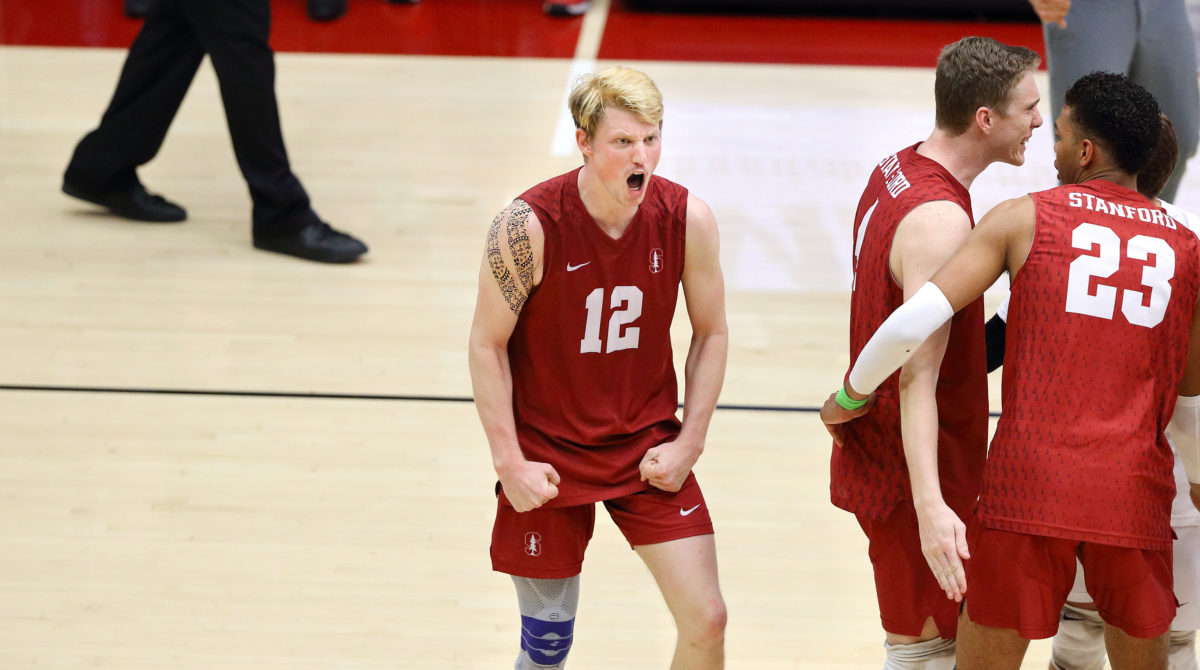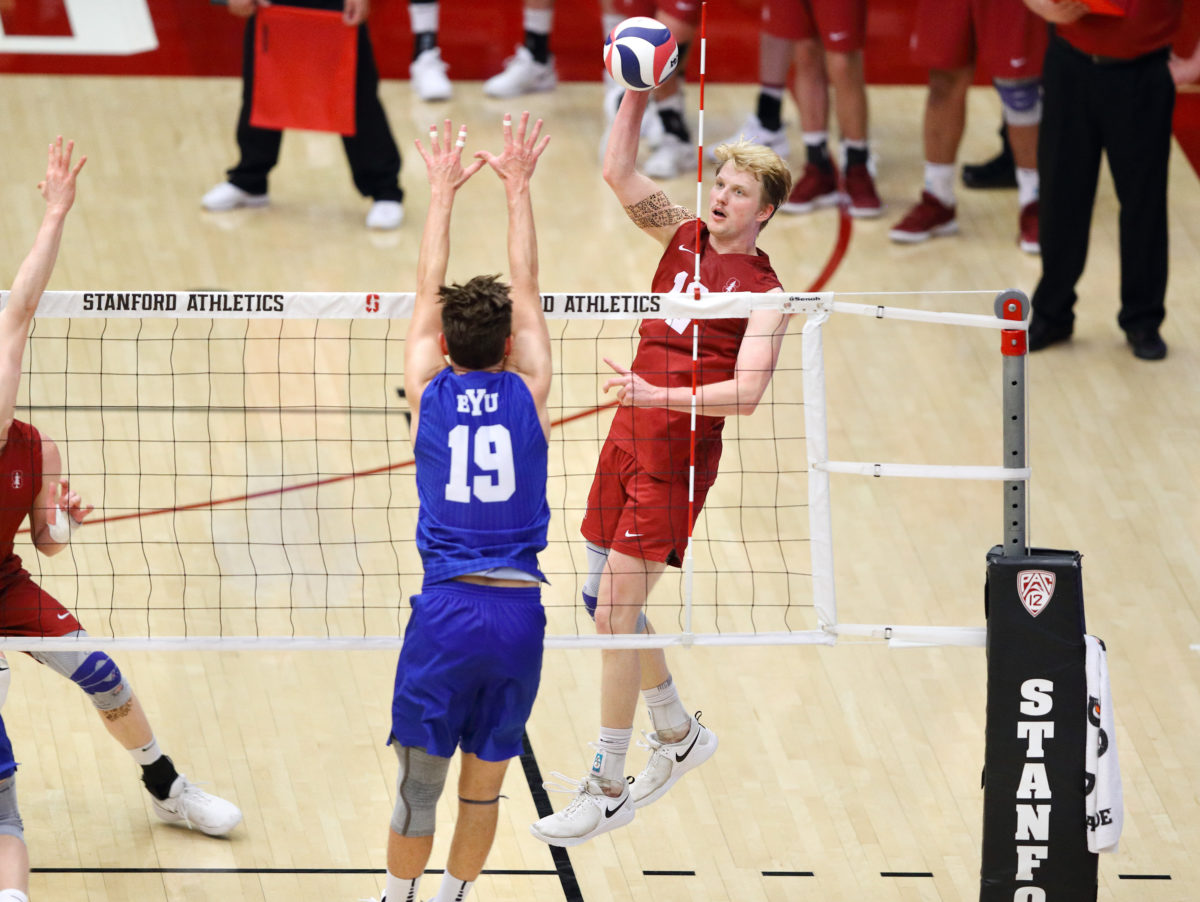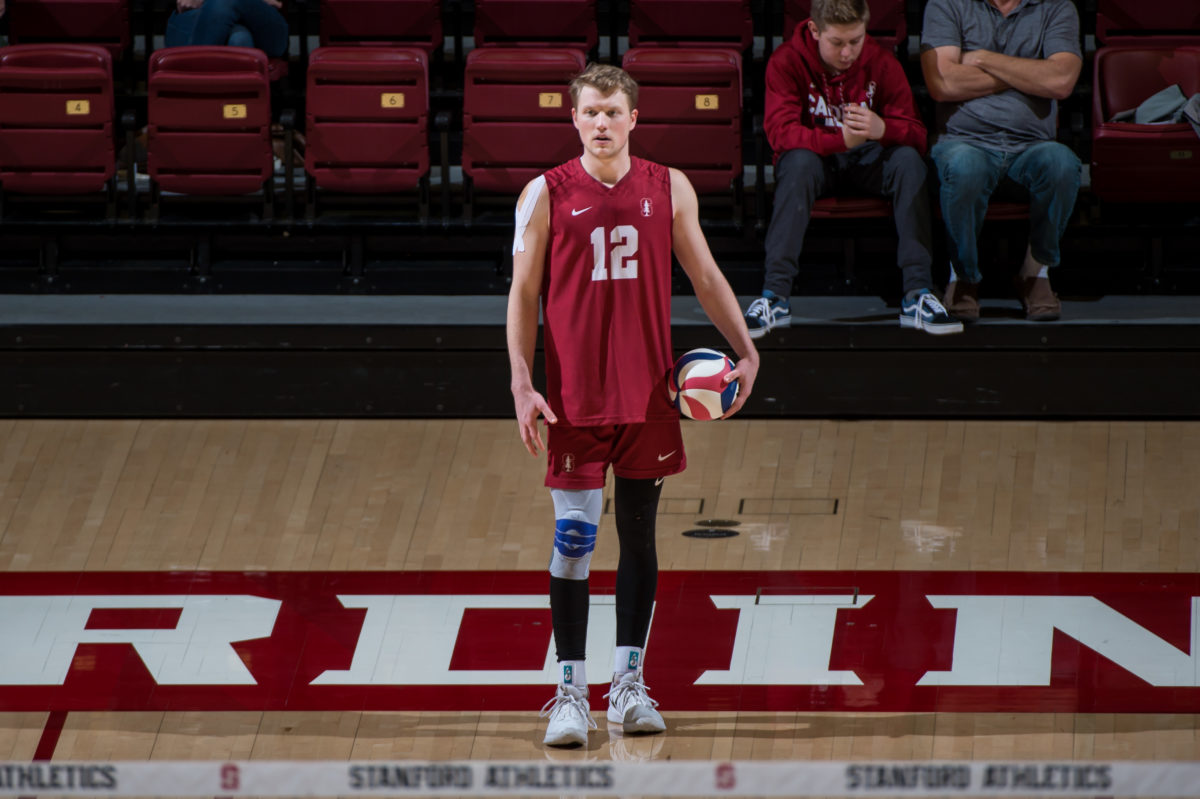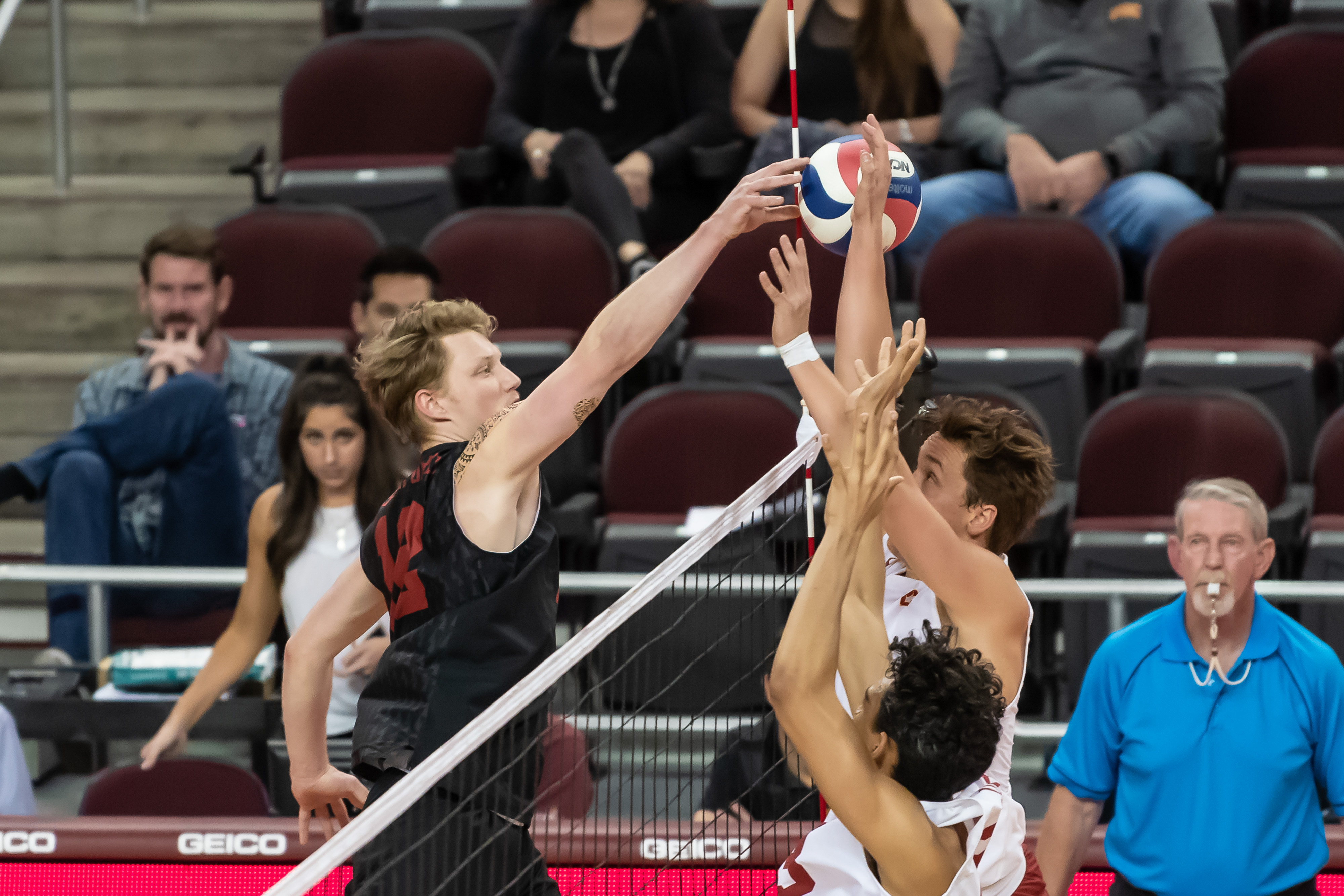This article is part of a running series The Daily sports staff will be publishing on graduating seniors.
Jordan Ewert emerged this season as one of the volleyball team’s most productive critical members. For the first time in his career, he was named an All-American after the conclusion of this season. The outside hitter from Antioch, California was tabbed for the 2019 All-MPSF second team. He ranked in the top 15 in the MPSF in kills (3.65; fourth), hitting percentage (.313; seventh), points (4.00; eighth) and digs (1.68; ninth) this season. Ewert’s kills per set average was 15th in the country in 2019. He led the team with five double-doubles. The Daily’s James Hemker sat down with Ewert to reflect on his time, both on and off the court, at Stanford.
The Stanford Daily (TSD): What made you choose volleyball?
Jordan Ewert (JE): I played soccer mainly growing up, and then somewhere around eighth grade I grew like six inches and soccer just got a lot harder. I just did not enjoy the running and all the conditioning. So I started playing volleyball at the end of eighth grade. Some friends invited me to a volleyball tournament, and a coach saw me and invited me to play on his club team. I fell in love with it and quit soccer and moved on to volleyball. I got onto a really good team, and I had a really good coach. I was successful, so it drove me to keep going.
TSD: At what point did you realize you could do this into college, and when did Stanford come on the radar?
JE: I realized I could play in college when I was 15. I played a year up with Joe Worsley, who’s now the Hawai’i setter, and his dad was our coach. We were playing in the 16 division, and that’s when college coaches start looking, so even though we were younger we had that exposure. So one day when we were playing, there was a UCLA assistant coach watching our court. He talked to our coach who then came up to me afterward and said, “UCLA wants to get in contact with you.”
For Stanford, I had been coached by Ken Shibuya, our assistant coach, before for Team U.S.A. He had coached me at holiday camps, and he was always somehow involved with U.S.A. team stuff. So I knew him well, and he had always joked about me going to Stanford. When I was finally old enough, they were one of the first schools to reach out and send me an email.

TSD: Do you remember your first day of practice here?
JE: That day was the first day of school. We had a physical we needed to go to on Sunday, and we were all late to it. Actually, we were on time and our coach told us the wrong time. So our first day our coach yelled at us and threatened to kick us off the team for messing up the first thing we could mess up. When we got into practice, our coaches weren’t really happy, and while there wasn’t really yelling, there was a lot of extra conditioning and diving, stuff that we don’t like to do. But for me, I had been used to that before because that was similar to how my club coach had been.
TSD: Looking back now, does it feel like a blur?
JE: Yeah, it does. Especially because I missed half my sophomore season and most of my junior season. I still feel like a sophomore playing, like I have a couple more seasons left. It just doesn’t feel real that it’s over. At the same time, I’ve accepted it and moved past it.
TSD: Was redshirting ever an option for you?
JE: I wanted it to be, especially last year, but I got played in like the first set of the first match of the season against a pretty crappy team, and that was all it took to get rid of the redshirt. So it never got to happen, which sucked, but I had to accept that.
TSD: What are some of your favorite moments?
JE: One of my favorite moments was my first game of my freshman year. I was the only freshman on the court. We had a stacked team, we were dope, but we had been underestimated in the rankings and were like ninth in the country. We were playing at BYU, which is the hardest court to play at, on their opening night, and they were seeded first in the nation. We went in there, I was with my other freshman buddies, and we see Ben Patch, who’s this freak athlete. He starts bouncing balls and I’m thinking, “Oh my god.” I’m a freshman. I’m small. I’m terrified. And then we went out and won the game, and it was pretty gnarly. I played alright, but I was just a freshman. We beat them in five, and it was super close, and the crowd was insane, and that was my first college match. That’s a pretty unreal memory.
And then another one would probably be this year. Finally being on the court with Russell [Dervay] and Chris [Moore], who are the other seniors. Its normally just me and [redshirt senior Kyle] “Dago” [Dagostino]. I have, in all my years here, never been on the court with someone my age, which is harder than you would think it would be. Having everyone either younger than you or older than you makes you feel isolated on the court. When someone is your age and is in your class, there is just a different relationship, and you feel closer to each other. So being on the court with them against UC San Diego was pretty great.
TSD: What were some of your unanticipated challenges that you had to overcome?
JE: Well — the injury my sophomore year. It happened in practice when I landed terribly on my ankle, and the rest of the season was gone. That was rough because I got multiple opinions on how long it would be before I got back, so I was hopeful that I would get back before the end of the season. That didn’t happen, so that was really hard.
My junior year I had some academic issues that resulted in me not being able to play for the entirety of winter quarter, which was a very hard challenge as well. Then, having to come back for the last five games of the season was another challenge. The team had been meshing all season, and then they threw me and [setter] Paul [Bischoff], who had been injured as well, into the mix. So there were two new elements that changed the dynamic of the team and we had five games to figure it out. We did well, not great, but that was another challenge.

TSD: You do a lot of different things on the court, from hitting to blocking to passing. What are your favorite aspects of the game on the floor?
JE: Hitting is my favorite. That is the ultimate reason why I play. I mean, yeah, I pass and receive, but that was because I’m on the smaller side for my position, so I had to get good at it. Taller outside hitters are usually so physically dominant that they don’t learn the defensive aspect of the game, especially in the back court. I had to learn the game a bit more. Passing was something that I learned to make up for my size. That is probably what I value the most in my game because its an important skill, and the team can’t do anything if you can’t pass the ball.
But my favorite has to be hitting, because that is the ultimate way to say, “I own you.” It’s always fun to frustrate opponents because I’m a different kind of hitter from most. I don’t just bomb balls, I’ll hit some soft and swipe them off the block. It works because not a lot of people do it. Messing with people’s heads and seeing them not know what to do is a lot more satisfying to me than any good pass.
Although, to be honest, if I could have played any position, I would have loved to have been a setter. It’s all about the idea of controlling the flow of the game. A hitter can sort of control the game by getting a lot of balls and getting a lot of kills, but there are so many more elements that setting can affect. I think it also just looks really cool.
TSD: A couple of people I have talked to have said that you’re one of the most competitive people that they have met. What fuels that in you, and is it an important part of your identity?
JE: I think it definitely is something that took me a while to embrace. In my club team we were very quiet and focused, and the only yelling was done by our coach. We were competitive in how we worked. Our work ethic was unreal, so that has always been there, but I didn’t show my emotions as much. In high school I was considered one of the top players, so I had a good amount of respect wherever I went. I didn’t feel the need to do anything more than I what I needed to do.
When I got to college and started playing with guys who were older, I realized that it wasn’t as simple as that. In college, there are so many different personalities and ages, so you have to find ways to motivate people, so my competitive spirit is how I do that. Sometimes it’s not the best because I get very emotional and I’m not afraid to wear my emotions on my sleeve; I think that’s why I have a big influence on the court, but, at the same time, it can have a negative influence. Its something I’m still working on.
Having not played as much in college, I now have a big chip on my shoulder. I didn’t win a playoff game in college, I’m only 6-foot-4, and I didn’t really do anything spectacular in college, so I feel I need to prove to everyone that I still got it. Obviously college is over, but I’m going to keep that going into my professional career because I’m not gonna friggin’ stop.

TSD: What was it like being a senior leader this year?
JE: It was a lot. A lot of ups and downs and times I felt like I had it figured out and times were I felt like I didn’t. Dago helped me a lot, and without him I don’t know where we would be. We would have been a lot worse this year. He kept me in check most of the time, and he helped me filter most of my feelings and make sure I was focusing on the right things.
This was my first time ever being the leader of a team. In high school, I guess I was the leader, but, you know, it was just high school ball. On my club team it was always Joe since his dad was the coach, and he was Joe. It was exciting for me, but I quickly learned that it was a lot harder than I was expecting it to be. You have to swallow your pride. It was a long season, but I learned a lot, and towards the end, especially those last couple weeks, our mentality really shifted. It was sad to see it end so soon. We were just getting to the place we needed to be. But now I’ve learned and can carry it with me.
TSD: Are you a superstitious player?
JE: I don’t know if I am. I have rituals and I do things before every game, but if I forget to do something its not on my mind. For example, before every game when we are shaking hands, I touch the bottom of the first antenna, shake hands, then jump and touch the top of the second antenna. Then I turn around and high five Dago and go into the huddle. That’s what I did every game, and then there was one where I had a lot on my mind and I forgot to do it. However, it wasn’t until I watched the film later when I realized. So I do it, but it doesn’t really affect me.
TSD: Is there anything now that is obvious to you, that you wished you had known as a freshman?
JE: It’s really not that hard to be on time to things. I remember thinking, “How do they expect us to be on time to everything, that’s insane!” And now I get that it’s really not that hard.
TSD: Now that you have some more time with your athletic career at Stanford over, is there a bucket list of things you want to get done?
JE: Ah, man, I’m just trying to graduate. I’m having fun, and it’s been nice to have more of a social life with friends that I wasn’t able to see during the season. It is weird that we have five weeks left and then I’m out of here. I’ve been spending time with some people that I usually don’t spend time with, so that’s been nice. But bucket list wise, I wouldn’t say so. In the end, I came here to play volleyball and do school. Since volleyball is done, I just need to finish school.
TSD: What are your future plans?
JE: My plan is to go play professionally in Europe. I’ve already signed with an agent. Right now they are in playoffs, and no one is getting signed at the moment. It’s all a matter of timing. I want to play over there. People don’t really believe me, but this is what I want to do for as long as I can. I want to get to the highest level, whatever it takes. I still have those little Olympic goals and dreams that kids have. They haven’t gone anywhere and I don’t really know what to do about it. It’s always in the back of my mind. Sometimes I have thoughts that maybe it would be best if I just hang it up, but I cant get it out of my head. So we’ll see — we’ll see. I mean, I know I can do it, I just need to prove it to the right people.
Contact James Hemker at jahemker ‘at’ stanford.edu.
